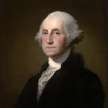George Washington Interview
George Washington's Surprising Revelations!

1. What were your favorite hobbies or pastimes outside of your military and political careers?
Well, I must admit, I enjoyed a good game of cards with my fellow officers, especially if there were some tasty refreshments involved. I also loved to go hunting, both for sport and to put some fresh meat on the table. Of course, there were also the ladies -- I won't say more than that!
2. Did you have any close friendships or romantic relationships during your lifetime?
I had many dear friends and companions over the years, but I was always very private about my romantic life. Suffice it to say, I did have a few love interests throughout my life, but I'll leave it up to your imagination to decide who they might have been.
3. What did you like to eat or drink, and were there any foods you particularly disliked?
As you might imagine, my palate was somewhat limited by the cuisine of the time. I enjoyed simple dishes like roasted meats, stews, and vegetables. I was also quite fond of drinking Madeira wine, which was quite popular in my day. As for dislikes, well, I always found the idea of eating oysters a bit repulsive, and I'm not sure I ever quite understood the appeal of snuff.
4. How did you feel about slavery, and did your views change over time?
Ah, now we come to a serious matter. I will say that I did own slaves for much of my life, and at times I struggled with the morality of it. In my later years, I did come to see slavery as a grave injustice, and I made provisions in my will to free my own slaves after my death. But I'll be honest, it was a complicated issue, and I never felt entirely at peace with it.
5. What kind of relationship did you have with your mother and siblings?
My mother was a very strong and influential figure in my life, and I loved and respected her deeply. I had several siblings, but unfortunately, many of them died at a young age. My brother Lawrence was a great friend and mentor to me, and his early death was a great loss.
6. What was your childhood like, and did any particular experiences or events shape your future outlook or behavior?
My childhood was a bit tumultuous, as my father passed away when I was just a boy. I was fortunate to have a loving and supportive mother, who instilled in me a sense of duty and honor that would stay with me throughout my life. I also had some formative experiences as a young soldier fighting in the French and Indian War, which taught me the importance of discipline and strategy.
7. How did you cope with personal tragedies, such as the deaths of loved ones or military setbacks?
I won't lie, there were times when I struggled with grief and despair. But I always tried to maintain a stoic and disciplined demeanor, and I leaned on my faith and my sense of duty to carry me through. When things got really tough, I would often turn to my trusted friend and confidante, Alexander Hamilton, for advice and support.
8. What did you think about the concept of democracy, and how did you envision the future of the United States?
I was a firm believer in the principles of democracy and republican government, and I saw the United States as a beacon of hope and freedom in the world. However, I also recognized that the success of our experiment in self-government was far from guaranteed, and that we would need to work hard to overcome the many challenges we faced. In the end, I hoped that the United States would serve as an example to the world of how a free and democratic society could thrive, and that our principles would endure for generations to come.
9. Did you have any particular fears or phobias, and if so, how did you manage them?
I wouldn't say that I had any particular fears or phobias, but I did have a deep sense of responsibility and a fear of failure. I was always conscious of the fact that the decisions I made could have far-reaching consequences, and that the fate of the nation rested on my shoulders. To manage this pressure, I tried to maintain a stoic and disciplined mindset, and I relied on my faith and my close relationships with friends and advisors to help me stay grounded.
10. How did your religious beliefs inform your values and actions throughout your life?
I was raised as an Anglican, and I maintained a strong faith throughout my life. My beliefs taught me to value honesty, integrity, and service to others, and I saw these values as essential to my role as a leader. I also believed that the United States had a special destiny in God's plan, and that it was our duty to fulfill that destiny through our actions and our commitment to justice and freedom. Of course, I also believed in the importance of religious tolerance and freedom, and I worked to ensure that all Americans had the right to worship as they saw fit.
About the Creator
Ivan Ipšić
Hi, my name is Ivan and I enjoy writting about various topics. Join me on this journey and let's create something meaningful together.






Comments
There are no comments for this story
Be the first to respond and start the conversation.